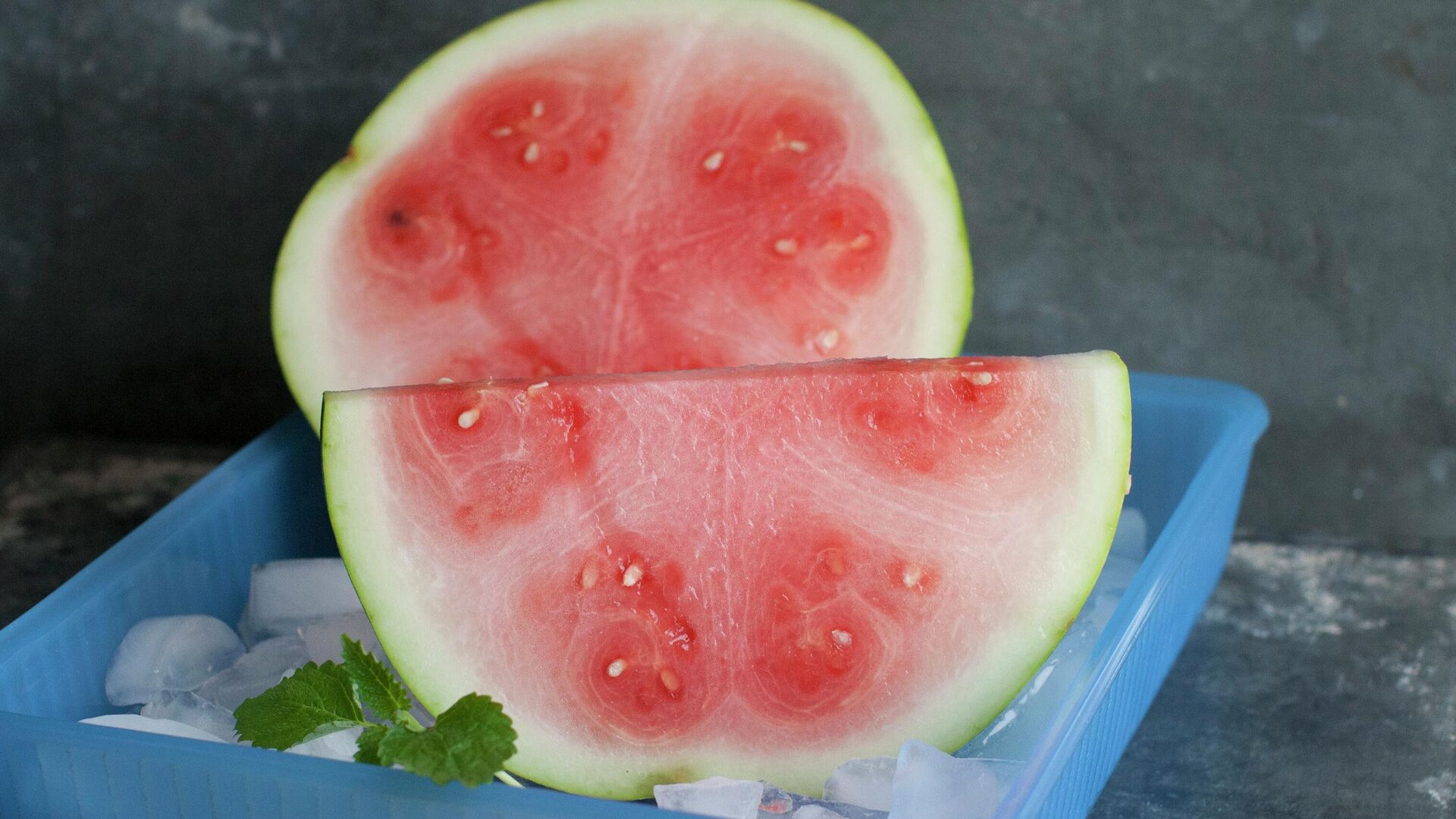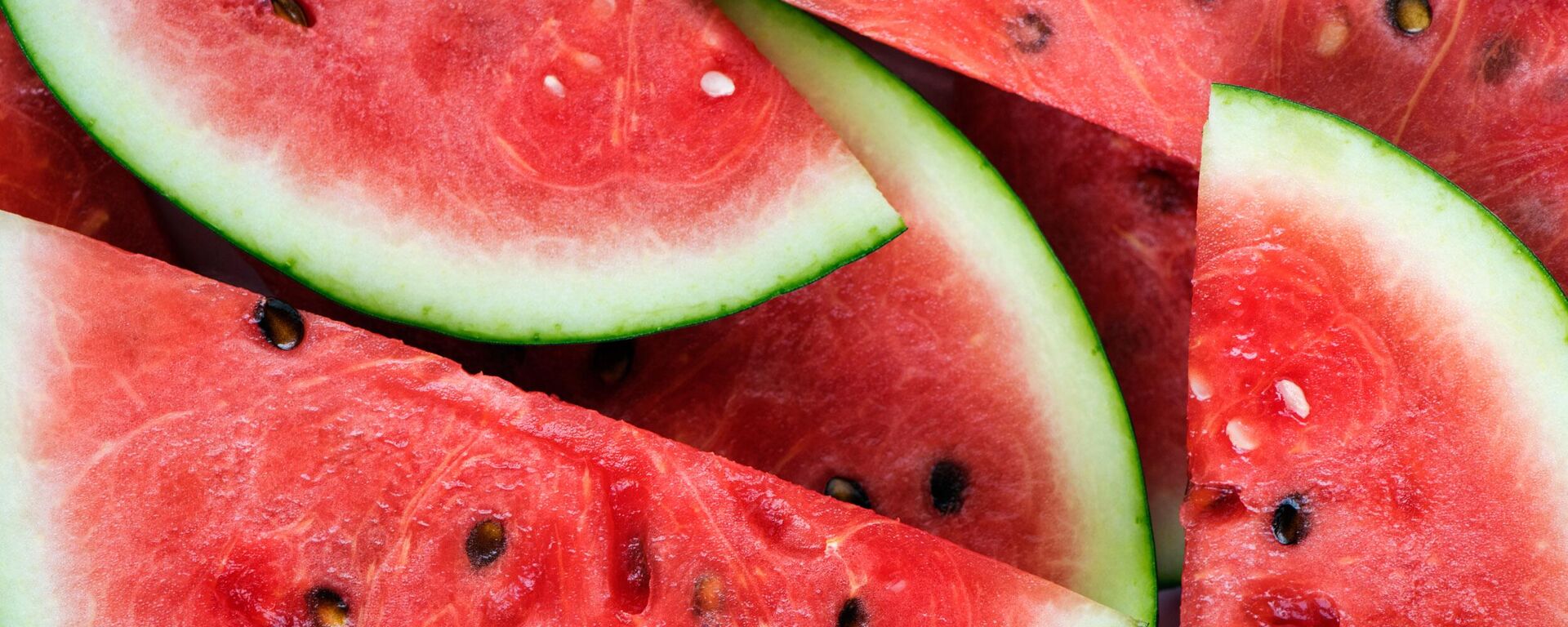https://en.sputniknews.africa/20230808/why-do-watermelons-from-africas-largest-producer-lack-flavor-1061149178.html
A Matter of Taste: Why Do Watermelons From Africa's Largest Producer Lack Flavor?
A Matter of Taste: Why Do Watermelons From Africa's Largest Producer Lack Flavor?
Sputnik Africa
Algeria, the world's fifth-largest watermelon producer, and the leading one in Africa, with an estimated 2.2 million tonnes per year, has contributed 1.6% to... 08.08.2023, Sputnik Africa
2023-08-08T10:37+0200
2023-08-08T10:37+0200
2023-08-08T15:37+0200
north africa
algeria
agriculture
water resources
drought
farmers
https://cdn1.img.sputniknews.africa/img/07e7/08/08/1061151396_0:0:3032:1705_1920x0_80_0_0_ed308bcb169323609203cf0f7256927c.jpg
During the summer, fresh and delicious watermelons are often a great way to beat the heat. But this year, Algerians are not happy with the taste. Despite its exceptional size and bright red color, Algerian watermelons are said to be lacking in sweetness. A slew of possible causes has been pointed out in an article, published by a local media outlet. Watermelons vary in sweetness based on a number of factors, including their specific variety, the soil and the weather conditions in which they were grown, and how they were cared for while growing. Some watermelon varieties are sweeter than others, while specific growing conditions can result in sweeter fruit. In addition, watermelons that are left on the vine to fully ripen tend to be sweeter than those that are picked early.Among other things, the article cited the changes that have taken place in recent years in the technique of grafting, which has developed considerably in Algeria. It is well known that grafting is usually done with fruit trees. This is also the case today with watermelons. But watermelons are grafted on what kind of plants? On pumpkin ones. According to the article, farmers thus gain in growth rate, disease resistance and the final weight of watermelons. Today, it is possible to see on social networks a farmer showing off the biggest watermelon, weighing up to 20 kg.In addition, excessive rain in the north of the country in June may have prevented the accumulation of sugar, the article pointed out. Moreover, reports say that the price of watermelons is too high because of the lack of irrigation water in certain regions, which would have made the product scarce. A key fact to keep in mind is that the production of watermelons requires a lot of water, and Algeria suffers from an endemic drought.
https://en.sputniknews.africa/20230528/this-african-country-is-worlds-5th-biggest-watermelon-producer-1059534344.html
north africa
algeria
Sputnik Africa
feedback@sputniknews.com
+74956456601
MIA „Rossiya Segodnya“
2023
Sputnik Africa
feedback@sputniknews.com
+74956456601
MIA „Rossiya Segodnya“
News
en_EN
Sputnik Africa
feedback@sputniknews.com
+74956456601
MIA „Rossiya Segodnya“
Sputnik Africa
feedback@sputniknews.com
+74956456601
MIA „Rossiya Segodnya“
north africa, algeria, agriculture, water resources, drought, farmers
north africa, algeria, agriculture, water resources, drought, farmers
A Matter of Taste: Why Do Watermelons From Africa's Largest Producer Lack Flavor?
10:37 08.08.2023 (Updated: 15:37 08.08.2023) Algeria, the world's fifth-largest watermelon producer, and the leading one in Africa, with an estimated 2.2 million tonnes per year, has contributed 1.6% to world output. This year, the largest producer of watermelons in the Arab world is facing an unexpected problem with its fruit.
During the summer, fresh and delicious watermelons are often a great way to beat the heat. But this year,
Algerians are not happy with the taste. Despite its exceptional size and bright red color, Algerian watermelons are said to be lacking in sweetness. A slew of possible causes has been pointed out in an article, published by a local media outlet.
Watermelons vary in sweetness based on a number of factors, including their specific variety, the soil and the
weather conditions in which they were grown, and how they were cared for while growing.
Some watermelon varieties are sweeter than others, while specific growing conditions can result in sweeter fruit. In addition, watermelons that are left on the vine to fully ripen tend to be sweeter than those that are picked early.
Among other things, the article cited the changes that have taken place in recent years in the technique of grafting, which has developed considerably in Algeria. It is well known that grafting is usually done with fruit trees. This is also the case today with watermelons. But watermelons are grafted on what kind of plants? On pumpkin ones.
According to the article,
farmers thus gain in growth rate, disease resistance and the final weight of watermelons. Today, it is possible to see on social networks a farmer showing off the biggest watermelon, weighing up to 20 kg.
It was suggested that the technique of grafting may partly explain why Algerian watermelons are so bland and tasteless this year.
In addition, excessive rain in the north of the country in June may have prevented the accumulation of sugar, the article pointed out.
Moreover, reports say that the price of watermelons is too high because of the lack of irrigation water in certain regions, which would have made the product scarce. A key fact to keep in mind is that the production of watermelons requires a lot of water, and Algeria suffers from an endemic
drought.


